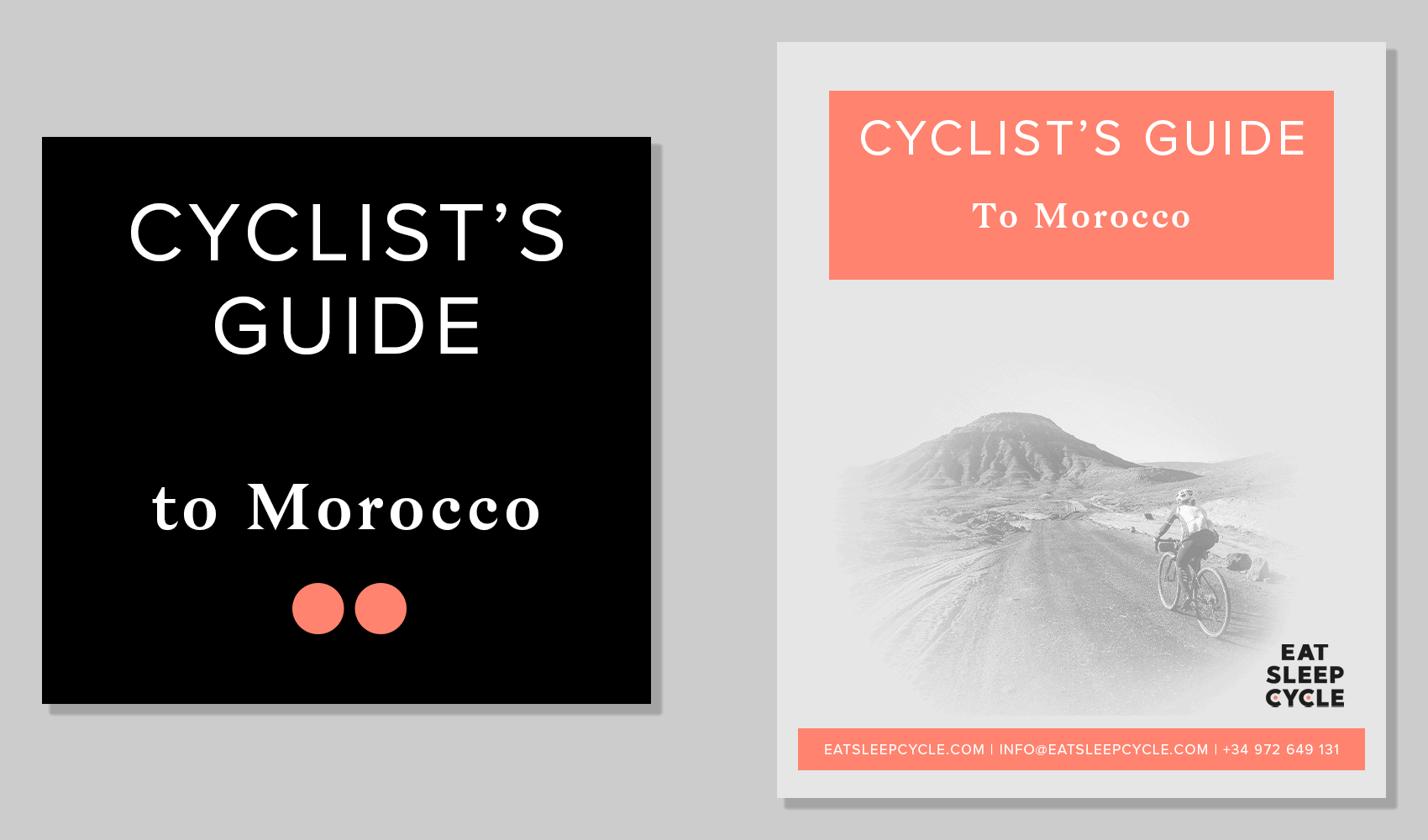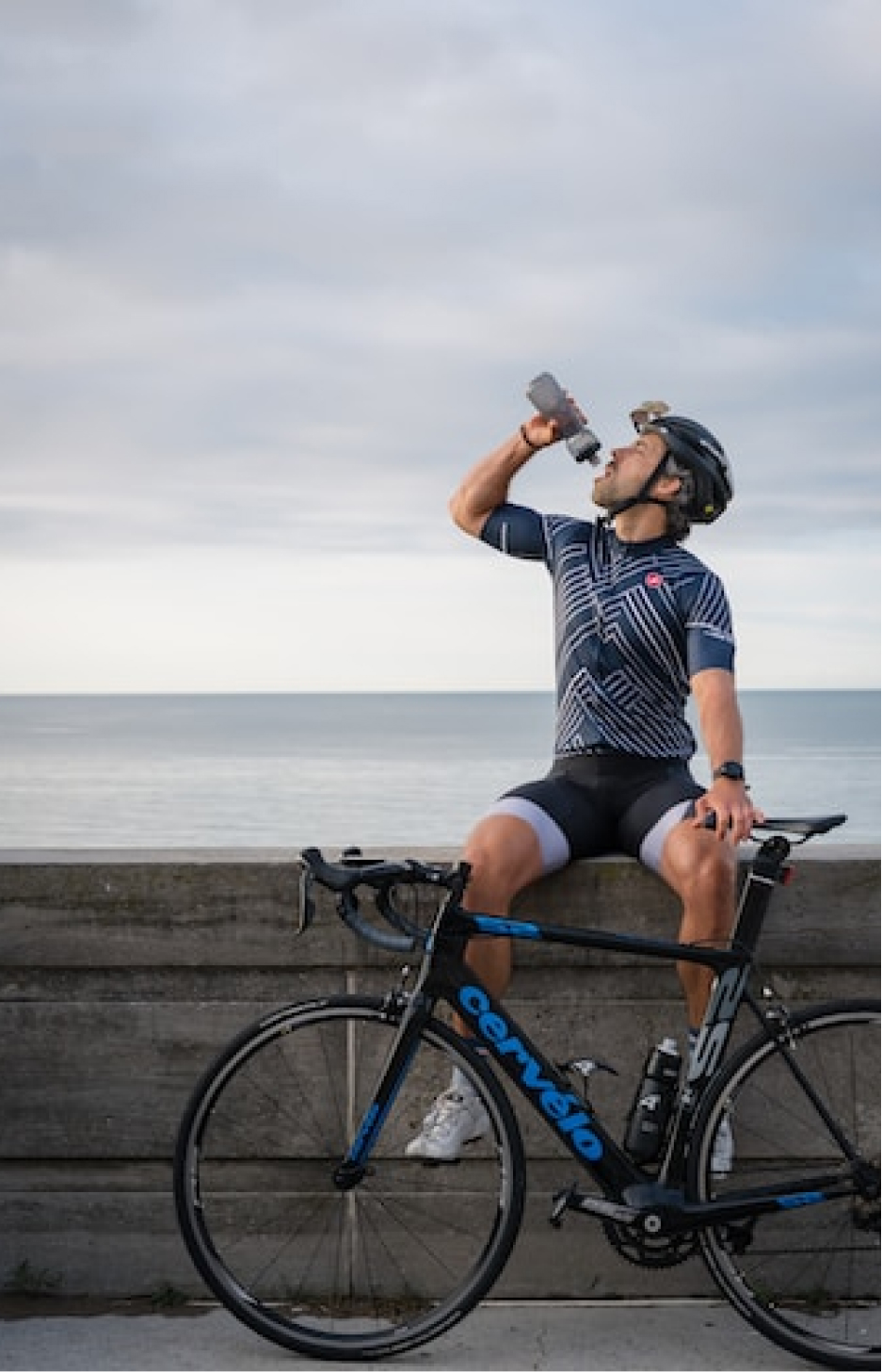Morocco is an off-the-beaten track destination with a fast growing reputation for all types of cycling. Eat Sleep Cycle founders Lee & Louise set off to spend a week exploring Marrakesh & the Atlas mountains by bicycle. They came back with this blog, a starter guide for anyone thinking of cycling in Morocco as well […]
Morocco is an off-the-beaten track destination with a fast growing reputation for all types of cycling. Eat Sleep Cycle founders Lee & Louise set off to spend a week exploring Marrakesh & the Atlas mountains by bicycle. They came back with this blog, a starter guide for anyone thinking of cycling in Morocco as well as incredible memories of mind-blowing rides & wonderful people.
Cycling in Morocco
When you think of Morocco you might imagine crazy drivers, rough roads, pickpockets, bartering & dodgy food – all the ingredients of a terrible cycling holiday! But think again – Morocco is a vast country of varied terrain, beautiful landscapes, friendly people, delicious food, fabulous guesthouses and is home to some seriously good riding.
When is it best to ride in Morocco?
Choosing the time of your visit carefully is key. Avoid the summer months of June through August, it’s just too hot. The autumn, winter & early spring are all great times to cycle with balmy temperatures & good conditions for legs-out riding. Just be aware that if you want to ride the high Atlas mountains you may encounter some snow & some ice at altitude in ‘winter’. The ice usually melts by mid-morning, so a perfect excuse for a lazy Moroccan breakfast before clipping in for the day.
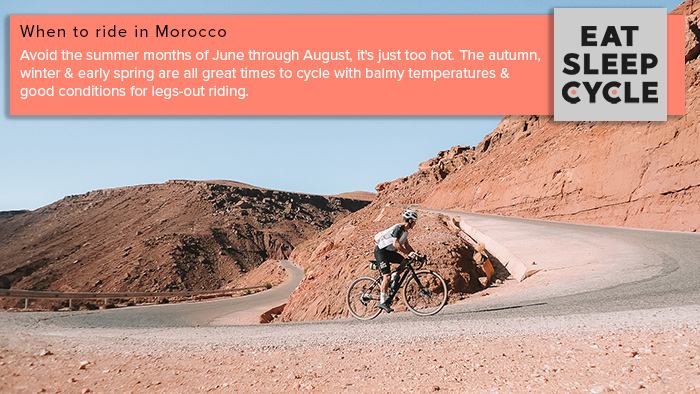
Choosing a Bike for Cycling in Morocco
This is a huge question with no right or wrong answer. The first thing to know is that cycling as a sport or a way to spend a holiday is not normal here. Locals are seen piled onto scooters, donkeys, into pick-up trucks or simply walking to get from A to B. The only bikes around are Decathlon rejects, sometimes seen grinding up huge mountain passes – and not for fun.
For us pleasure-seeking cyclists a lightweight machine will make a huge difference when cycling in the mountains. Wide tyres will make a huge difference on rough sections of road (of which there are a fair few). A pure road bike would be too harsh, an endurance road bike with 30 c tyres would be pretty great if you were planning on enjoying mostly road riding.
A gravel bike in Morocco makes a lot of sense. Not only will you soak up the bumps on rough sections of road, you’ll also have the flexibility to turn off on a desert track or switch out a busier road for a dirt one. Yes, you’ll need to work a little harder on any pure road climbs, but the sacrifice is worth it.
Mountain bikers would also have a blast here – hardcore mountain bikers should look up Mount Toubkal. At over 4,167 m it’s the highest mountain in North Africa. There are specialist guides who can take you up – just make sure you have excellent insurance for coming down.
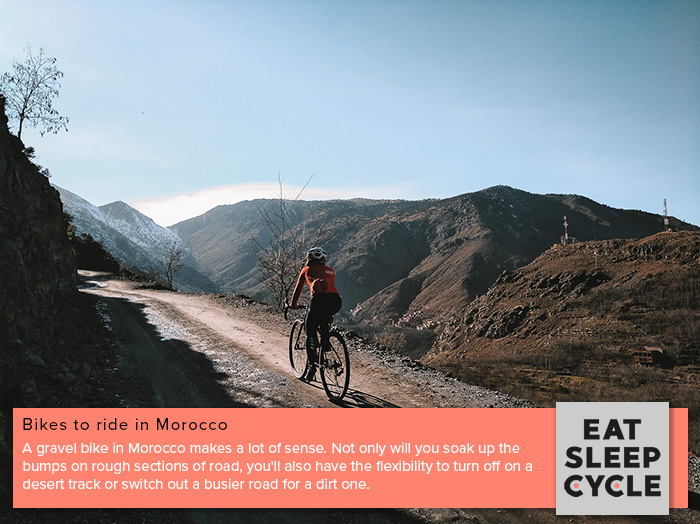
Is it Safe? What is the Traffic Like?
The traffic has it’s own laws. Drivers are generally not in a rush but will launch dangerous overtaking maneuvers to get around slow moving trucks. Cyclists are generally given space (as are the donkeys, pedestrians & scooters) but it’s definitely worth doing your research on which roads are great & which roads are best avoided. Quiet roads are fabulous roads. Busy roads should only be attempted when completely unavoidable.
Cycling in Marrakech would only be enjoyable if you’re an experienced rider with bike-messenger style skills & a strong nerve. Embrace the flow and everything will probably be ok, or just hitch a ride 20 kms out of the city to keep things zen.
Where to Stay in Morocco?
There are plenty of places to consider basing yourself for a cycling trip in Morocco and it’s best to pick two, three or even four locations to really experience the variety of the riding. Most groups & tours start & finish in Marrakech but quickly move out to escape the city & get to the best roads & trails. There is no obvious cycling hub to stay in, but great locations are Ouirgane – for great riding in the foothills of the Atlas & access to the huge Tizi n’Test pass, Imlil – for Mount Toubkal & Tisseldeï for the Tichka pass, the mud city of Ait Benhaddou & some desert riding.
The best stuff is impossible without support or without a tent. Do not underestimate the difficulty of covering large distances at altitude. It’s important to have a set up whereby you’re completely self-sufficient, or at least have a number you can call if you need a rescue. The Moroccan people are such that if you’re basing yourself at a guesthouse the owners will likely offer their phone number by way of back up & will even come and look for you if you don’t return by your scheduled time.
Recommended guesthouses include:
Riad Atlas Imlil, Imlil – a newly built Riad with exceptionally welcoming hosts, Lahcen & Abdullah. The ceilings are hand painted by a local artist, the rooms are furnished in traditional Berber style & the food is fabulously prepared by Lahcen’s uncle. This is the place to enjoy the best breakfast for cyclists in Morocco! They can also arrange bikes for you & can cater for all dietary requirements.
Dar Isselday, Tisseldeï – a small oasis at the bottom of the Tizi n’Tichka pass run by Famita, Kamal & their family. Stay in small but comfortable rooms, eat delicious food prepared by the family and relax on the beautiful terrace overlooking the valley.
Tagadert Lodge, Oumnass – an exquisite guesthouse 20 kms south of Marrakech located in a typical Berber village. Combining the best of Moroccan & modern design with welcoming staff, Saide, Fatima & Mohammed.
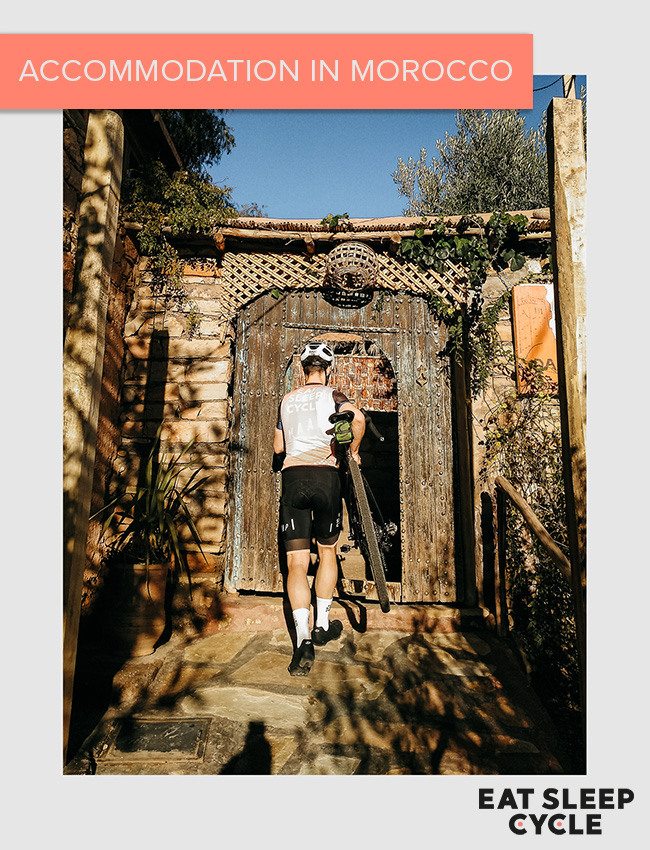
What to Eat in Morocco?
Do not travel to Morocco if you don’t like cumin. Cumin is quite literally the spice of life here and can be found in pretty much every dish. This is a country where it’s difficult to eat unhealthily with fresh fruit, vegetables and meat being the main food.
The staple dishes in Morocco are tagine – a slow cooked stew with chicken, lamb, beef & vegetables, or couscous, with chicken, lamb, beef & vegetables. Meals are a delicious mix of sweet & spice, but nothing so spicy that can’t be enjoyed. Soups are also popular, as well as meat grilled over open fires.
Breakfasts are a delicious mix of fresh juices, bread in all kinds of delicious forms, served with olive oil or jams, as well as eggs – served fried (with cumin!) or as an omlette.
Fresh fruit is high on the agenda and delicious fresh juices are readily available. Good coffee can be found but is not guaranteed. Berber Whiskey is readily available, that is tea made from all sorts of fresh herbs and served with our without sugar.
Which brings us nicely to the subject of alcohol. Drinking is not illegal in Morocco, indeed, there is a local beer in production as well as two or three winery’s. In fancy hotels, licenced bars & tourist areas it’s possible to order an alcoholic drink off a menu but in off-the-beaten track rural areas (where your bicycle is most likely to take you) it’s not. If you really need a drink to recover from a long day in the saddle be discreet when you ask at your guesthouse or simply resort to Berber Whiskey (tea!) & embrace the clarity of mind & health benefits avoiding alcohol brings!
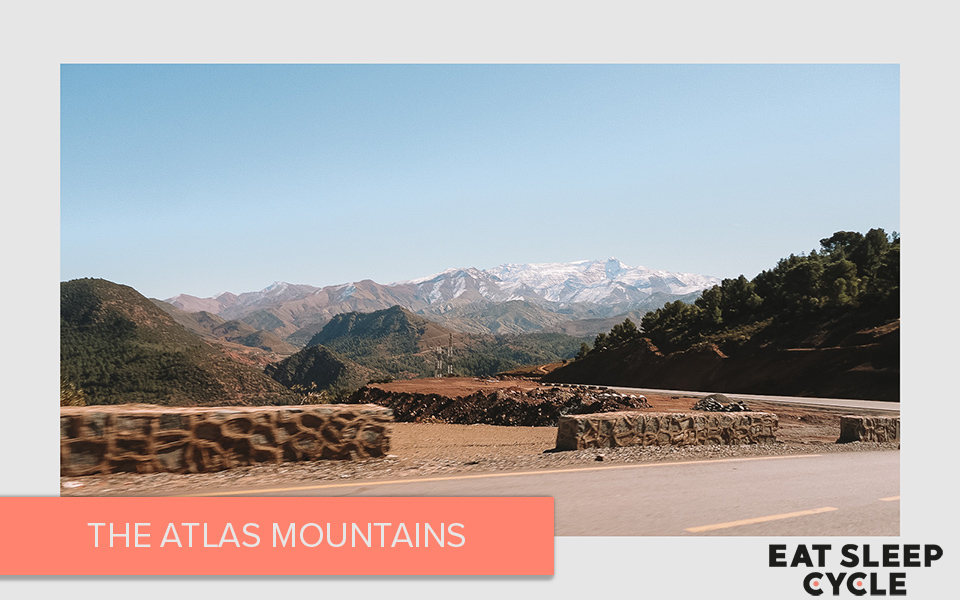 Morocco Cycling Routes
Morocco Cycling Routes
Now to the fun stuff! There are no ‘set’ cycling routes in Morocco as is the case in European cycling hubs like Girona, Mallorca or Calpe. However, there are some awesome highlights to include in your agenda.
Tizi n’Tichka Pass – the gateway to the High Atlas, this pass separates Marrakesh in the north from the road to the Sahara desert in the south. This is the climb used by GCN on their bikepacking Morocco adventure. It’s a paved road climb and, as the main route for vehicles heading south, can be quite busy. The road is in a constant state of flux and has near continuous roadworks underway to maintain the route. The climb tops out at 2,260 m altitude. From the village of Zerkten (already at 1,200 m altitude) the climb is over 30 kms long. Gradients are steady & the views are spectacular!
Tizi n’Test Pass – this climb is a little known monster that rivals the Stelvio & Tourmalet for cycling greatness. From the village of Ijoukak (itself a long drag away from Marrakesh at 1,100 m altitude) the climb winds its way up a river valley for 40 kms to an altitude of 2,100 m at the top. The road is broken & doesn’t have much traffic. The descent is broken for the first 6 kms then turns to silky smooth tarmac all the way to the bottom.
Tizi n’Tacheddirt – a high mountain pass and a village at an elevation of 2,425 m above the sea level. Access to this unpaved road is from the village of Imlil (altitude 1,700 m). It’s gravel, rocky, bumpy & is not for cyclists with vertigo. From November to April there are varying amounts of snow – seek the advice of a local guide before setting off to conquer this one. The climb is 13 kms long and best suited to wide-tyred gravel or mountain bikes.
Toubkal – another monster from Imlil, this time just for skilled mountain bikers. The trail is 14 km long to the summit of Toubkal, with a monster elevation change of 2,435 m to an altitude of 4,100 m. Only attempt this with a qualified local guide & factor in the impact of altitude. This is a seriously tough challenge to the summit of the highest peak in the Atlas Mountains.
Ait Benhaddou to Telouet – The road connecting these two places is quite simply awesome. From Ait Benhaddou, the 1000 year old mud city & UNESCO world heritage site, the paved road climbs alongside a river. Soak up the sites of local villages as the road heads up. The surface is paved but sometimes broken & gravelly – a road bike with wide tyres or a gravel bike is ideal. This road can also be enjoyed an an alternative descent from the Tizi n’Tichka Pass.
Agafay Desert – 30 kms south of Marrakesh is a stony dessert, full of trails, camels & quad bikes! The region extends over several hundred acres and is ripe for exploration on a gravel or mountain bike. Lake Takerkoust is a man made lake on the edge of the desert with a wealth of gravel roads to explore & great places to stay.
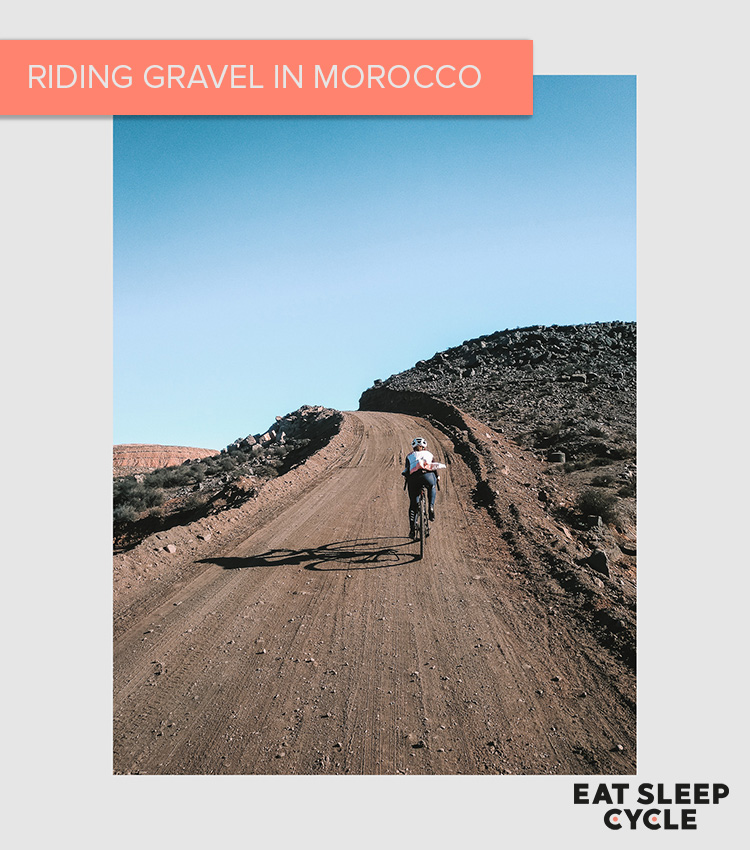
Is it ok to wear Lycra?
Yes, but you’ll stick out like a sore thumb & might feel a little exposed!
For women, there is still a stigma attached to exposing bare skin and ladies will feel more comfortable wearing lightweight, floaty materials which act as a cover up, especially off the bike. As well as respecting the local culture it’s actually the best clothing to wear outside in the sun too. That said, there are unwritten rules for tourists and plenty of women on holiday in Morocco set out to get a tan without any consequences.
On the bike lycra is likely the most comfortable choice, although baggier clothing as per mountain bike/gravel/touring gear will still be comfy & help you blend in a little better. It’s something everyone will appreciate if you stop at a local cafe for a bite to eat whether you’re a male or female cyclist but it comes down to your personal choice.
Getting to Morocco
Getting to Morocco is easy, with regular flights from all over Europe into Marrakesh. Marrakesh gives you best access to the riding covered in this blog, but there are also airports in Rabat, Casablanca & Fes to the north.
Marrakesh airport is just a few kms from the city centre, so transfers are fairly cheap – it’s by far the easiest to book a transfer through your hotel if you’re staying Marrakesh for the start or finish of your cycling trip. Don’t get into a random car outside the airport. Car hire is also a good option & there are plenty of well known companies located at the airport.
Make sure you land with a clear plan to get your next destination. The airport is a magnet for wondering locals looking to earn a fast buck from confused tourists.
Cycle in Morocco with Eat Sleep Cycle
If you’d like to sign up to our Morocco Atlas Mountain tour, give us a call on +34 972 754 301 or contact us online for more info! We also run custom gravel, road or mountain bike tours in Morocco – let us know what you’re looking for & we’ll do the rest!
P.S. Enjoyed this blog? Why not sign up to receive notifications every time we post and get regular updates on our latest tours!

